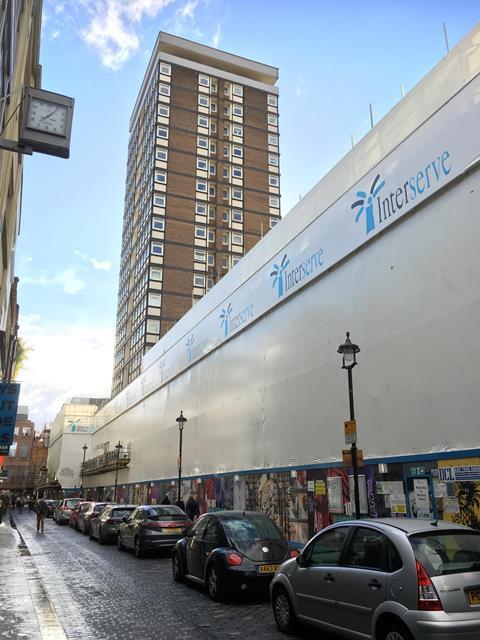What does Interserve’s prepack administration actually mean – for suppliers, customers, employees and lenders? Is the reborn business on a sound enough footing to enable the ‘business as usual’ the company promises? And can we expect further developments?

Since £3bn-turnover contractor Interserve’s 15 March prepack administration, the new bank-owned company that emerged has been very keen to stress that it remains business as usual for suppliers, clients and partners. The move put the group’s parent company, Interserve plc, into administration, while its banks were allowed to take the assets into a new business – now called Interserve Group – in return for writing off £485m owed to them. While shareholders have lost everything, the firm’s PR people say this arrangement leaves the business, under existing chief executive Debbie White, with vastly reduced debts, new credit facilities and a strong position to carry on, almost as if nothing happened.
Clients, employees and subcontractors of the support services and construction giant will – largely – be relieved.
However, big questions remain about what exactly the reborn Interserve Group has taken on from the failed plc, and what it has left behind. Prepack administrations, while saving jobs and limiting the chaos caused by company collapses, are notorious for giving a legal escape route for businesses to effectively carry on trading while escaping their creditors.
“They can bring those liabilities across. but obviously, the more liabilities they take on, the less benefit they get from the administration process”
Simon Beale, Macfarlanes
The new group’s company secretary has already gone on record saying the business did not view the prepack “as an opportunity to leave our liabilities behind”, and the business has been at pains to say that suppliers will be paid for work done. However, customers owed money on problem jobs remain in the dark as to what exactly will be the impact of the dramatic collapse.
So, what exactly do we know about where all this boardroom drama leaves customers and suppliers, and what it might mean for the long-term future of the group?
Read: A timeline of Interserve’s financial problems
Read: ‘Greedy capitalists’ felled Interserve, says Cabinet minister

Is Interserve liable for its previous debts?
For most of Interserve’s suppliers and 68,000 employees, the answer is likely to be yes. But it’s not, alas, quite that straightforward. Of course, much of the bank debt of the previous business has been wiped out by the prepack, and shareholders have lost everything.
Suppliers’ fears are understandable because, in general terms, prepack administrations are specifically designed to allow otherwise functioning businesses to shed their liabilities – debts, in other words – and then resume trading. This would appear to be bad news for creditors. John Hughes-D’Aeth, partner at law firm Bryan Cave Leighton Paisner, says: “The whole point of a prepack administration is that liabilities remain with the old company, leaving the new company to continue to trade debt-free.”
“My guess is they will want to sell the construction business, as there are buyers out there looking”
Stephen Rawlinson, Applied Value
The idea is that a deal to sell a business – in this case to Interserve’s lenders – is arranged prior to administration and then executed immediately the administrator is appointed. In Interserve’s case EY was appointed administrator on Friday 15 March, and the sale – which essentially allowed the refinancing proposed by the banks, and which was voted down by shareholders, to go ahead anyway – happened on Monday 18 March. Julie Palmer, regional managing partner at insolvency specialist Begbies Traynor, says: “The purchasing organisations can look and decide ‘what shape of organisation would I most like?’ and do a deal for that.”
Despite this, most Interserve suppliers are likely to be protected. This is because only the parent company of the Interserve group – Interserve plc – went into administration, with all its operating company subsidiaries continuing to trade. Contracts undertaken with these subsidiaries remain valid, with Interserve liable for any debts. A spokesperson for the new firm said all construction contracts were held with subsidiaries rather than the plc.
Certainly, two customers on contracts that have had significant problems – Viridor on the Glasgow energy-from-waste (EfW) plant and Glennmont Partners for the Margam EfW facility – confirmed to Building that their contracts were with Interserve Construction Ltd, not Interserve plc, meaning they should be free to pursue claims. Viridor, for example, claims to be owed £64m, while Interserve said in its 2018 results it expects to pay out just £14.7m to Viridor.
Even if there are any contracts that were undertaken with the plc company which is now in administration, the new firm is free to honour them if it chooses. Simon Beale, head of the insolvency practice at law firm Macfarlanes, says: “If there’s a relationship with a key customer or supplier they want to preserve, then they can bring those liabilities across. But obviously, the more liabilities they take on, the less benefit they get from the administration process.”
Last week, Interserve company secretary Andy McDonald said the company had decided against “cherry picking” which bits of the business to take across into the new company and which to put into administration. Instead the company decided to bring all subsidiaries across wholesale into the new entity.
Is the business now on a sound financial footing?
Prior to going into administration, Interserve was burdened by an enormous, £640m debt mountain resulting from acquisitions and write-offs against its disastrous foray into energy from waste facilities. This was worsened by the market’s steady loss of faith in its future following the collapse of Carillion. Interserve admitted in February that suppliers were unable to get credit insurance when trading with it, meaning it had to pay suppliers in advance, and that it was struggling to collect debts on its Middle Eastern work. It also racked up £33m in professional fees trying to get the refinancing deal through.
Following the prepack administration, the firm is no longer listed on the stock market, meaning it does not have to provide up-to-date financial information. However, the business has made clear that, in broad terms, the result of the prepack has been to execute anyway the refinancing package proposed in February by Interserve management following discussion with its banks – albeit with former shareholders losing everything, rather than (just) 95%. The de-leveraging plan was that by swapping approximately £485m of debt to the banks for ownership of the business, the business’ net debt would be reduced to no more than twice its operating (or, technically, ebitda) profit – which last year was £93m before exceptional items. Most of what debt remained was to be ringfenced within Interserve’s profitable formwork business, RMD Kwikform, and a further debt facility of £110m was to be created to give the group enough working capital to manage cash inflows and outflows.
Sector analyst and consultant Alastair Stewart says: “The balance sheet looks OK now, but I’d still assume clients and supply chains will approach Interserve with a heightened degree of due diligence.”
The remaining debts mean the firm is still, however, likely to be among the more indebted contractors in the sector, albeit it is backed by banks that have already stepped in to save it and appear unlikely to want to write off their investment now. However, the confirmation that Viridor’s £64m claim still hangs over the business means there is the potential it needs to pay more money out than expected.
Stephen Rawlinson, analyst at Applied Value, says: “In the current market any debt level above one times ebitda profit is frowned upon. This is hardly a debt-free business. But as long as it’s financially well-backed, suppliers and customers won’t desert it.”
What about Interserve customers?
While a prepack administration can offer huge benefits to firms like Interserve where the operating business is weighed down by enormous corporate debts, it also brings big risks. The reputational damage has the potential to be significant. “While it looks like few if any will have contracted directly with the plc firm,” says Alastair Stewart, “reputationally the administration still has some impact.”
But there are more practical risks too. Principal among these is what administration means for existing contracts – Interserve’s bread and butter. All standard UK construction contract forms include clauses that either automatically terminate contracts in the event of the contractor going into administration, or else give the client an automatic right to do so. While the last thing most customers midway through a building project would want to do is to change contractor, this contractual situation means administration does give the client an opportunity to renegotiate terms if it thinks it can, and means any disgruntled customer can simply walk away.
Hence, key to making the prepack successful for Interserve will be persuading any affected customers to novate their contracts over to the new business, Interserve Group. Ann Minogue, partner at Macfarlanes, says: “Novation transfers everything as if the contract had been held with the new company from the start. For a lot of customers this is very attractive; otherwise they’re left floundering trying to find someone to finish off a job.”
The trouble is that where customers feel they have leverage, they may be inclined to use it to hold the contractor to ransom. Begbies Traynor’s Palmer says: “As a contractor, you can’t unilaterally move the contracts you want across to the new business. You have to go on a charm offensive – it will be up to the customer whether they like the cut of the jib of the new company. It comes down to a commercial bargain.”
Again, the extent of problems raised by this issue for Interserve will largely be determined by whether there are actually any construction contracts held with the plc parent that has gone into administration. Contracts with subsidiary firms not placed in administration will continue as before – with no right for the client to renegotiate or walk away. “There is only this get-out clause if the legal entity you’ve contracted with goes into administration,” explains Macfarlanes’ Minogue.
What will happen next with Interserve?
The business says it is focusing on trading as per usual, and continuing to implement its 2017-launched Fit for Growth restructuring programme, which it claims will eliminate £40m-£50m in costs each year from 2021.
However, Cenkos analyst Kevin Cammack said in a note issued shortly after the administration went through that it would be “naive” to believe the business will just continue as before. His assumption, supported by other analysts, is that the banks will have no long-term interest in running it, and will want to recoup as much of their investment as quickly as they can. Cammack said: “The best way for this to be executed is not for Interserve to continue as it is but to be progressively dis-assembled.”
Reports have already emerged that rival outsourcing giants Mitie and Serco are mulling bids for its support services business. Applied Value analyst Stephen Rawlinson says: “The big issue is what the owners are going to do. If they want to get out of construction, previous experience suggests this is an incredibly expensive thing to do.”
The clearest route for the banks to generate some cash would be through selling RMD Kwikform, which Rawlinson says could be valued at anything up to £400m, with divisions such as Paragon Interiors also thought to be attractive.
“My guess is they will want to sell the construction business, as there are buyers out there looking,” he says. “Then they can bring a slimmed-down support services business back to the [stock] market at some point in the future.“


























No comments yet